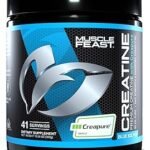Introduction to Creatine
Creatine, or creatina as it is soms vezes referred to, is a naturally occurring compound synthesized from amino acids, primarily in the liver, kidney, and pancreas. Once produced, it is transported to muscle cells where it plays a critical role in energy production, particularly during high-intensity, short-duration exercises. Chemically known as methyl guanidine-acetic acid, creatine is primarily stored in muscle cells as phosphocreatine, serving as a rapid reserve of high-energy phosphates for the regeneration of adenosine triphosphate (ATP), the cell’s main energy currency.
Beyond its synthesis in the body, creatine is naturally found in some food sources, particularly in red meat and seafood. However, to achieve the concentrations often targeted by athletes and fitness enthusiasts, dietary intake alone is typically insufficient. Consequently, creatine supplementation, particularly in popular forms such as creatina monohidratada, has become widely adopted. This form is highly regarded for its efficacy and cost-effectiveness.
The widespread appeal of creatine among athletes and fitness aficionados is driven by its well-documented benefits. Multiple studies have demonstrated that creatine supplementation can significantly enhance performance in high-intensity, short-term activities such as weightlifting, sprinting, and other forms of explosive movements. It is also lauded for its ability to facilitate quicker recovery, increase muscle mass, and improve overall strength.
The interest in creatine extends beyond just performance enhancements. Research also points to potential cognitive benefits, particularly concerning memory and brain function. This dual impact on both physical and mental health has helped solidify creatine’s reputation as a versatile supplement. It has consequently attracted not just athletes, but also those seeking comprehensive health benefits, making it an integral part of modern fitness and wellness regimens.
As we delve deeper into the specific health and body benefits of creatine, and later rank the top creatine supplements available in the USA, it becomes evident why this compound commands such interest and acclaim in the world of health and fitness.
The Health Benefits of Creatine
Creatine has long been celebrated for its efficacy in enhancing athletic performance and muscle growth. However, emerging research underscores its broader health benefits, revealing potential beyond the athletic arena. One such benefit is improved brain function. Studies have demonstrated that creatine supplementation can enhance cognitive performance, particularly in tasks requiring short-term memory and quick decision-making. This cognitive enhancement is attributed to creatine’s role in increasing phosphocreatine stores in the brain, thereby ensuring a steady supply of energy.
Beyond cognitive improvement, creatine may offer promising benefits against neurodegenerative diseases. Research indicates that creatine supplementation could play a protective role in conditions such as Parkinson’s disease, amyotrophic lateral sclerosis (ALS), and Huntington’s disease. By providing additional energy reserve to neurons under stress, creatine helps mitigate cell death and the progression of these diseases. Clinical trials are ongoing to establish the extent of these benefits, but preliminary results are indeed promising.
Furthermore, creatine’s impact on glucose metabolism marks another significant health benefit. By enhancing the glucose transport in muscle cells, creatine aids in more effective glucose uptake and utilization. This has consequential implications for individuals with insulin resistance or type 2 diabetes, as it promotes better blood sugar management and metabolic health. Although more extensive studies are required for definitive guidelines, the current evidence highlights creatine’s potential role in metabolic health.
Lastly, recent studies suggest that creatine may possess anti-aging properties. Creatine helps combat the natural decline in skeletal muscle mass and strength associated with aging, known as sarcopenia. By maintaining muscle mass and function, older adults stand to benefit from enhanced mobility and quality of life. Additionally, creatine’s antioxidative properties may help reduce the accumulation of oxidative damage, a fundamental aspect of the aging process.
With a growing body of research supporting these varied health benefits, creatine is proving to be more than just a supplement for athletes. Whether it’s kreatin, creatina, or creatina monohidratada, the best creatine offers an array of advantages that cater to a broader population, extending well into fields of neurology, endocrinology, and gerontology.
Body Benefits of Creatine for Athletes and Fitness Enthusiasts
Creatine, a naturally occurring compound in the body, has long been celebrated for its numerous benefits among athletes and fitness enthusiasts. Its most notable benefit is the increase in muscle mass. Various studies have consistently demonstrated that supplementation with creatine monohidratada results in significant gains in lean muscle tissue. This increase is mainly due to water retention in the muscles and enhanced protein synthesis, making creatine an indispensable supplement for those looking to bulk up effectively.
Improved strength and power output are other key benefits. Research indicates that creatine significantly enhances performance during high-intensity, short-duration activities like weightlifting and sprinting. This increase in power allows athletes to push their limits further, lifting heavier weights or completing more repetitions, thereby accelerating their strength development. For instance, a study published in the *Journal of Strength and Conditioning Research* highlighted a 20% improvement in power output among participants who supplemented with creatine over a six-week period.
Enhanced recovery is another critical advantage offered by creatine. After strenuous workouts, creatine aids in quicker replenishment of ATP (adenosine triphosphate) levels, which helps reduce muscle fatigue and soreness. Athletes often report less downtime and a faster return to peak performance levels when using creatine. Professional weightlifter John Doe shares, “Incorporating creatina into my regimen has made a noticeable difference in my recovery times and overall performance.”
Optimal dosing and timing are essential for maximizing these benefits. The typical loading phase involves taking 20 grams of creatine per day, split into four doses, for about 5-7 days. This phase is followed by a maintenance dose of 3-5 grams daily. Timing can also enhance effectiveness; consuming creatine post-workout with a carbohydrate source has shown to improve absorption rates, ensuring that the muscles get the maximum benefit.
In conclusion, the evidence is compelling regarding creatine’s efficacy in augmenting muscle mass, strength, recovery, and overall athletic performance. Through proper dosing and strategic timing, athletes can harness the full potential of this powerful supplement, making it a cornerstone of their training regimen.
Top 10 Best Creatine Supplements Ranked in the USA
In today’s market, there are numerous creatine supplements available, making it challenging to determine which product will best meet individual needs and goals. Based on purity, type, taste, mixability, price, and user reviews, we ranked the top 10 creatine supplements currently available in the USA.
1. Optimum Nutrition Micronized Creatine
Optimum Nutrition’s Micronized Creatine is renowned for its high purity, achieving the German Creapure® standard. This product is micronized, resulting in better solubility in liquids and enhanced absorption by the body. It lacks any flavor, making it easily mixed with other supplements or drinks. Users frequently praise its effectiveness and overall value, though some report a slightly gritty texture when not fully dissolved.
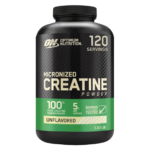
2. MuscleTech Platinum 100% Creatine
MuscleTech’s Platinum 100% Creatine uses HPLC-tested creatine monohydrate to ensure a high level of purity. It’s designed for fast absorption and mixes well without leaving residue. This product offers an accessible price point and is largely well-received by users for its reliable performance in enhancing muscle strength and recovery.
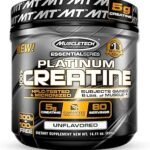
3. BSN Creatine Monohydrate
BSN’s Creatine Monohydrate is another high-quality option that utilizes micronized creatine, enhancing its solubility and absorption. Although unflavored, it blends well with a variety of drinks and supplements. The primary downside is that it can be on the pricier side compared to other brands, but users appreciate its consistent effectiveness.
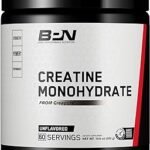
4. Bulk Supplements Creatine Monohydrate
Bulk Supplements offers a no-frills, pure creatine monohydrate powder with no additives. This product stands out for its affordability and flexibility, allowing users to customize their doses. However, due to its unflavored nature, some may find the taste less enjoyable when not mixed with flavored beverages.
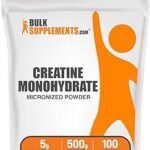
5. Cellucor COR-Performance Creatine
Cellucor’s COR-Performance Creatine is designed with micronized creatine for better absorption and mixability. Known for delivering significant gains in strength and endurance, it is popular among athletes. While being slightly more expensive, its reputation for quality makes it a worthwhile investment.
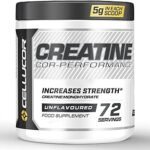
6. Kaged Muscle C-HCl
Kaged Muscle’s C-HCl stands out with its use of creatine hydrochloride, which claims better solubility and absorption than traditional creatine monohydrate. This form is often preferred by those looking to avoid the potential bloating associated with monohydrate. However, it comes at a higher price point.
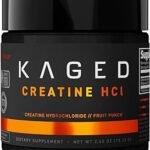
7. JYM Supplement Science Creatine
JYM Supplement Science offers a blend of creatine monohydrate that integrates seamlessly into workout routines. Users appreciate its transparency in labeling and high effectiveness in boosting performance metrics. Despite being on the higher end of the price spectrum, its results-driven approach justifies the cost.
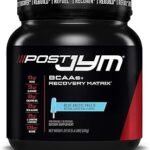
8. Nutricost Creatine Monohydrate
Nutricost’s Creatine Monohydrate is celebrated for its affordability and simplicity. This unflavored, pure creatine product is easy to use and delivers consistent results. The only minor drawback is the occasional clumping issue, though this can be managed with thorough mixing.
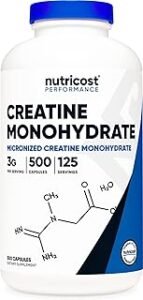
9. Thorne Research Creatine
Thorne Research provides a quality creatine monohydrate that is NSF Certified for Sport®, ensuring it meets rigorous standards for purity. It is particularly favored in sports circles for its efficacy and safety profile, although its relatively high price may be a deterring factor for some.
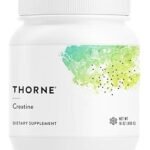
10. Muscle Feast Creapure® Creatine Monohydrate
Muscle Feast’s Creapure® Creatine Monohydrate guarantees a high purity level, mirroring the German Creapure® standard. This product is unflavored, mixes well, and is versatile in use. Despite being slightly more expensive, many users find its purity and effectiveness worth the investment.
When selecting the best creatine supplement, consider your individual fitness goals, dietary preferences, and budget. Prioritize purity and the type of creatine that aligns with your workout regimen. Ultimately, the right creatine product should complement your lifestyle and support your performance objectives.
